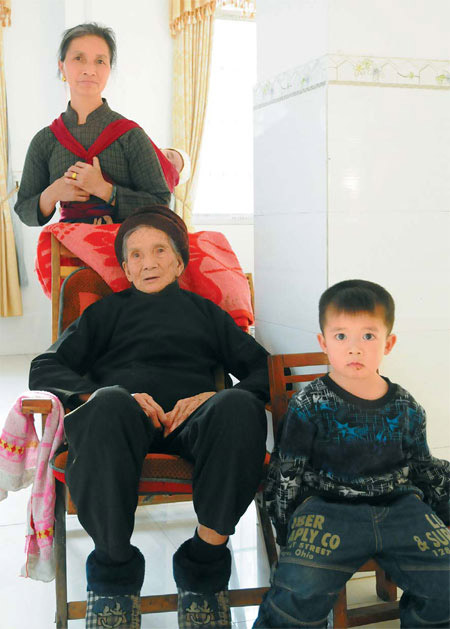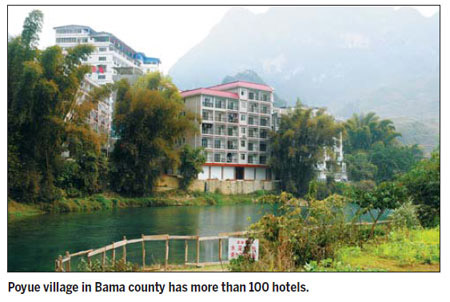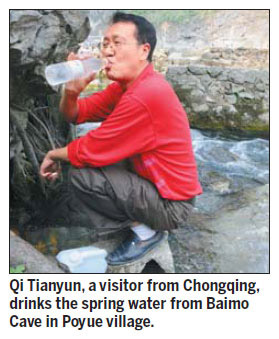China's old people's home
 |
|
Huang Mahan, 105, is the oldest person in Poyue village, Bama Yao autonomous county. Photos by Xu Lin / China Daily |


Bama in the Guangxi Zhuang autonomous region is the hot new destination of China's senior citizens in search of a quiet place to retire. Xu Lin and Huang Feifei report in Guangxi.
It's 8 am. Liu Zhenfa, 76 and his wife Wang Yaomin, 72, squat down beside a spring to draw water in plastic containers. More elderly people are doing the same thing, and some of them even drink the water directly.
"The water is good for my health and I fetch it every day for drinking and cooking," says Liu, a farmer from Jiamusi, Heilongjiang province.
Like the couple, there are several thousand migrant elderly living in retirement in Bama Yao autonomous county, Guangxi Zhuang autonomous region. The county, famous for its sizeable population of people who live long, is also home to China's oldest person, the 127-year-old Luo Meizhen.
Liu and his wife Wang came to Poyue village six months ago. Their daughter and son visit them from time to time.
There are 576 households with 2,576 residents in the village, of Han descent or belonging to Zhuang and Yao ethnic groups. There are three people over the age of 100, more than 70 over the age of 80, and 26 have crossed 90.
As more and more people flock in, rows of tall apartment buildings and healthcare centers have sprouted in the village.
"At first we were scared to drink the spring water directly, but others tell us it's fine to do so," Liu says.
"My high blood pressure was brought under control after I spent a month here. I would get epileptic attacks about once in two months, but it never strikes now."
Their monthly expense is about 1,100 yuan ($174), half of which is spent on rent. Like other migrant old people, they cook their own food, mostly vegetables - a healthy habit that also helps save money.
Migrant old people like to gather in front of Baimo Cave, a karst limestone cave in the village, to breathe in the fresh air circulating inside. It's warm in winter and cold in summer.
"The air in the cave is very good and we can enjoy the cool there," Liu says.
Liu says the migrant elderly population comes from all over the country, and many are couples. They usually rub shoulders with each other but don't often communicate with the locals.
Wang spends her evenings dancing with other women in the community, while Liu carries a radio to listen to traditional Chinese operas and chats with other old men.
"Life is much the same as that in our hometown. I do cooking and housework, take a walk and watch TV," Wang says.
Wei Junxian, 75, couldn't agree more.
"It's like being at home. While we were living in the city, my husband and I would often go to shopping malls to take a walk, but now we go to the nearby mountains, where the air quality is much better," says Wei, who used to be a doctor at a factory in Dongguan, Guangdong province.
She and her husband came to the village in February 2009 after watching a TV program about how Bama was an ideal place for people who lived to an old age. They paid 65,000 yuan ($10,297) to rent a 30-sq-m one-room apartment for 20 years. The construction had just about begun at that time.
"It's a common way for the locals to raise money for construction," she says.
In May 2010 they moved in and purchased furniture such as a bed and fridge, and articles of everyday use, which cost nearly 10,000 yuan.
"I bought many health products that did not work. The money I spent on those was sufficient to buy a house here," she says, jokingly.
"I don't feel congestion in my lung here. My husband has diabetes. He used to take pills three times a day, but now needs just one. The intake goes up when he goes back home."
She brings back food and medicines from her trips home.
"You don't get to buy much here, just snacks and medicine. There's no newspaper to read and less TV channels than that at my home," says Yuan Yegen, 80, who moved here from Guangzhou, Guangdong province in 2010.
"When I first came, I was unable to look after myself. But my physique started improving after six months. Now I can walk with a cane and even take a shower on my own."
Yuan spent a year in hospital, after he suffered a stroke, cerebral thrombosis and hyperglycemia.
"I stay here to recuperate. Once I'm healthy I will surely go back to be with my family," Yuan says.
"In recent years, more and more buildings are being built and prices of locally-available commodities, such as pork, are rising. The living cost is about 1,000 yuan per month," Wei says.
Wei says law and order is excellent in the village. Something valuable left on the street for several days won't get stolen.
"It's inconvenient to find a doctor and buy medicines. One has to go to the county town for hospital facilities," Liu Jingshu, 81, from Beijing, says.
"But they are not as good as those in big cities."
Liu says they have to line up to get a haircut and she worries about hygiene at the barber's shop. They have few choices to dine out, even in the county town.
"The locals should attach importance to environmental protection and construction supervision," says Liu, as she picks up a piece of waste paper lying on the ground, putting it in the dustbin.
According to Yang Shengguang, village director, as more tourists and migrant old people swarm in, more than 100 hotels have sprung up since 2009. There are about 20 buildings more than 10 storeys high.
"As many villagers couldn't afford to construct tall buildings, rich migrant people would rent their land and invest to build hotels. Villagers can live here once the building is complete," Yang says.






















